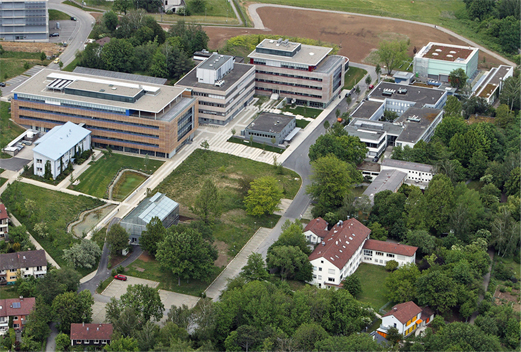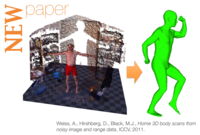
The Max Planck Campus sits at the top of a hill overlooking in Tübingen and the mountains of the Swabian Alb. The campus includes
The Max Planck Institute for Developmental Biology,
The Max Planck Institute for Biological Cybernetics,
The Max Planck Institute for Intelligent Systems,
The Friedrich Miescher Laboratory.
Research on campus includes the study of elementary biological processes ranging from the function of individual proteins to the evolution of species diversity, the function of the human brain using neuroscience methods, cognitive science, and imaging, and computational research on computer vision, machine learning and robotics.
There are also numerous collaborations with the University of Tübingen, including the Center for Integrative Neuroscience, the Bernstein Center for Computational Neuroscience, the Department of Computer Science, and the University Hospital Clinics
In total, about 700 people from over 45 different countries work on the campus. The Max Planck Guesthouse is the social centre of the Campus: it contains a cafeteria, library, lecture hall and accommodation. The Planckton nursery provides full-time daycare for babies and toddlers.
The Max Planck Institute for Developmental Biology,
The Max Planck Institute for Biological Cybernetics,
The Max Planck Institute for Intelligent Systems,
The Friedrich Miescher Laboratory.
Research on campus includes the study of elementary biological processes ranging from the function of individual proteins to the evolution of species diversity, the function of the human brain using neuroscience methods, cognitive science, and imaging, and computational research on computer vision, machine learning and robotics.
There are also numerous collaborations with the University of Tübingen, including the Center for Integrative Neuroscience, the Bernstein Center for Computational Neuroscience, the Department of Computer Science, and the University Hospital Clinics
In total, about 700 people from over 45 different countries work on the campus. The Max Planck Guesthouse is the social centre of the Campus: it contains a cafeteria, library, lecture hall and accommodation. The Planckton nursery provides full-time daycare for babies and toddlers.
Scenes from Video Workshop, Barossa Valley, Australia, Dec. 10-13, 2013
New BMI visualizer on-line. Visualize your BMI and learn how BMI relates to body shape using our 3D body visualization tool.
The 3D shape of the human body is useful for applications in fitness, games and apparel. Accurate body scanners, however, are expensive, limiting the availability of 3D body models. We present a method for human shape reconstruction from noisy monocular image and range data using a single inexpensive commodity sensor (the Kinect).



